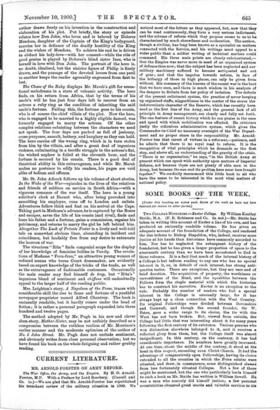C URRENT LITERAT LIRE.
MR. ARNOLD-FORSTER ON ARMY REFORM.
noticed most of the letters as they appeared, but, now that they can be read continuously, they form a very serious indictment, and the scheme of reform which they propose seams to us to be characterised by much shrewdness and moderation. The author, though a civilian, has long been known as a specialist on matters connected with the Service, and his writings must appeal to a wider public than a soldier writing of technical matters could command. His three main points are clearly substantiated,— that the Empire was never more in need of an organised system of defence than now; that the subject has been neglected and our military machinery suffered to become antiquated and out of gear; and that the impetus towards reform, in face of the lethargy of those in high places, can only be given from without. His summary of the lessons of the recent war is the best that we have seen, and there is much wisdom in his analysis of the dangers to Britain from her policy of isolation. The defects of the present enlistment system, the practice of never keeping up organised staffs, niggardliness in the matter of the stores the indeterminate character of the Reserve, which has recently been used as the first line of the Army, and the general lack of all principle in Army management, are clearly and fully set forth. The one feature of recent history which he can praise is the ease and speed with which mobilisation was effected. He criticises justly the ridiculous administrative system, which gives the Commander-in-Chief no necessary oversight of the War Depart- ment and no proper share in the responsibility. Mr. Arnold- Forster has that rarest of virtues in a reformer,—patience, and he admits that there is no royal road to reform. It is the recognition of vital principles which he demands as the first step, and above all, an understanding of the gravity of the crisis. " There is no organisation," he says, "in the British Army at present which can speak with authority upon matters of Imperial defence, not because there are not plenty of able men in the Army, but because the men and the problem have never been brought together." We cordially recommend this little book to all who have the sense to be interested in the most vital matters of national policy.






































 Previous page
Previous page